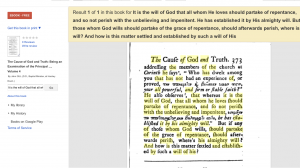Michael Horton, a Calvinist, in his book, 'Putting Amazing Back into Grace' (Baker, 2002), puts the exact quote you have in his book, trying to prove the TULIP before the time of Augustine.
Jack Cottrell did some research on Michael Horton & his claims. Here is what he found.
"I decided to do some checking myself. Under the cited texts that allegedly support “unconditional election,” Horton quotes Clement of Rome, claiming that Clement’s letter was written in A.D. 69 (several decades earlier than most scholars would put it). Part of the quote says, “Seeing then that we are the special elect portion of a Holy God, let us do all things that pertain unto holiness.”
"I found this in ch. 30 of Clement’s letter. The Greek says, hagiou oun meris hyparchontes poiēsōmen ta tou hagias mou panta. The fact is, there are no Greek words corresponding to “special elect” in this statement of Clement. The whole concept of election is READ INTO this quotation. Also, we should note that the context of the statement has nothing to do with election.
Another citation from Clement, in support of perseverance of the saints (the P doctrine), is given thus by Horton: “It is the will of God that all whom He loves should partake of repentance & so not perish with the unbelieving & impenitent. He has established it by His almighty will. But if any of those whom God wills should partake of the grace of repentance, should afterwards perish, where is His almighty will? And how is this matter settled & established by such a will of His?”
I had a very difficult time trying to find the section from which this quote SUPPOSEDLY comes. The closest I saw is in chapter 8. Here Clement cites several OT texts where God declares His desire for wicked Israel to repent, especially using Isaiah 1.
Then Clement says, “Desiring, therefore, that all His beloved should be partakers of repentance, He has, by His almighty will, established….” The text ends here; it does not say what God has established; the translation I used adds the words, “these declarations,” i.e., the OT quotations. The Greek text reads: pantas oun tous agapētous autou boulomenos metanoias metaschein estērizen to pantokratorikō boulēmati autou. The “quotation” AS CITED BY HORTON does not even come close to what the original is saying. To say that it supports “perseverance of the saints” is pure fantasy; it also ignores the context.
Another ancient document cited several times by Horton is the so-called Epistle of Barnabas, which he dates as A.D. 70 & attributes to “Paul’s sidekick” in the Book of Acts. (FEW scholars, if any, agree with this.)
Hope that helps.


